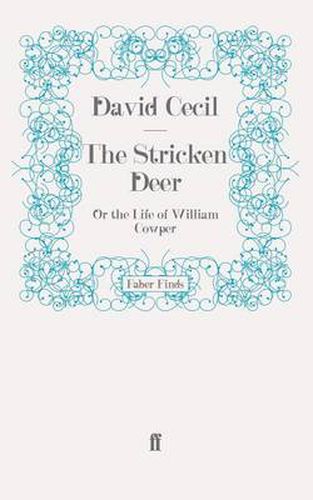Readings Newsletter
Become a Readings Member to make your shopping experience even easier.
Sign in or sign up for free!
You’re not far away from qualifying for FREE standard shipping within Australia
You’ve qualified for FREE standard shipping within Australia
The cart is loading…






First published in 1929, The Stricken Deer was the winner of that year’s James Tait Black Memorial Prize and also the Hawthornden Prize: it was David Cecil’s first book.
For a time, towards the end of the eighteenth-century, William Cowper was the foremost poet in England. But David Cecil’s biography doesn’t celebrate a life of success, rather, in Cowper’s own words, ‘the strange and uncommon incidents of my life.’ Cowper suffered from severe bouts of depression. His personal tragedy however enriched English literature: the fear of madness made him turn to writing poetry as a form of mental discipline, and isolation for the great world and from his own kind helped him to become the most enchanting of letter-writers.
‘This is a sympathetic and vivid biography; it is subtle with a kind of gentle acuteness and vivid without literary ostentation. It is the work of a biographer with a clear head and a clever heart … the rarest of all merits is the sensitive fairness of the of the biographer’s estimate of character and situation throughout.’ Desmond MacCarthy, Sunday Times
$9.00 standard shipping within Australia
FREE standard shipping within Australia for orders over $100.00
Express & International shipping calculated at checkout
First published in 1929, The Stricken Deer was the winner of that year’s James Tait Black Memorial Prize and also the Hawthornden Prize: it was David Cecil’s first book.
For a time, towards the end of the eighteenth-century, William Cowper was the foremost poet in England. But David Cecil’s biography doesn’t celebrate a life of success, rather, in Cowper’s own words, ‘the strange and uncommon incidents of my life.’ Cowper suffered from severe bouts of depression. His personal tragedy however enriched English literature: the fear of madness made him turn to writing poetry as a form of mental discipline, and isolation for the great world and from his own kind helped him to become the most enchanting of letter-writers.
‘This is a sympathetic and vivid biography; it is subtle with a kind of gentle acuteness and vivid without literary ostentation. It is the work of a biographer with a clear head and a clever heart … the rarest of all merits is the sensitive fairness of the of the biographer’s estimate of character and situation throughout.’ Desmond MacCarthy, Sunday Times